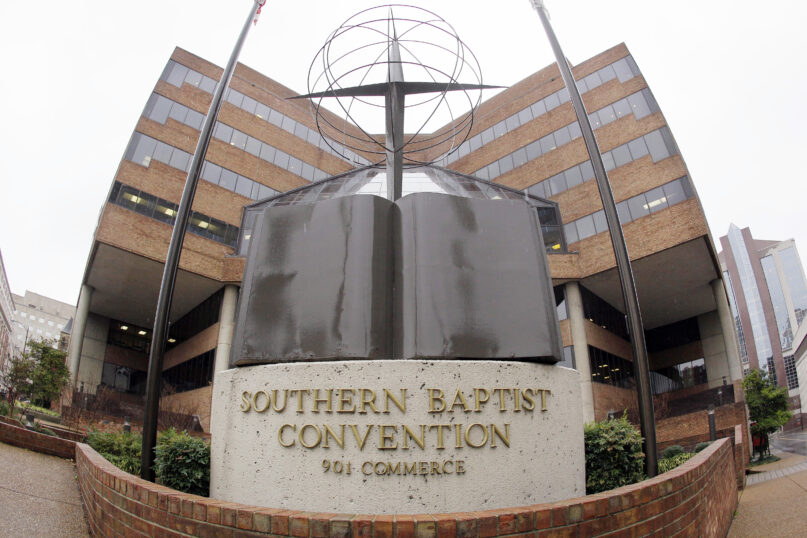(RNS) — For decades, a handful of leaders in the nation’s largest Protestant denomination treated sexual abuse survivors as enemies of the church, denied responsibility for the actions of local churches and downplayed the number of sexual abuse cases in those churches, all in the name of protecting the institution, according to a report released Sunday (May 22).
The report, conducted by a third-party investigations firm, Guidepost Solutions, and made public by the Southern Baptist Convention’s sex abuse task force, reveals a callous disregard for abuse survivors and a relentless commitment to protecting the denomination from liability.
Guidepost Solutions found that SBC leaders were well aware of abuse cases in the church and even compiled a list of offenders but took no steps to find out if alleged abusers remained in ministry, instead focusing on protecting the SBC from liability.
“In service of this goal, survivors and others who reported abuse were ignored, disbelieved, or met with the constant refrain that the SBC could take no action due to its polity regarding church autonomy — even if it meant that convicted molesters continued in ministry with no notice or warning to their current church or congregation,” investigators wrote.
The report also details graphic allegations of sexual assault by former SBC president and longtime megachurch pastor Johnny Hunt. The investigators determined those allegations were credible despite Hunt’s denials. Hunt issued a separate denial of the allegations Sunday afternoon.
The report also accuses SBC leaders of taking concrete and intentional steps to hide information about sexual abuse from trustees in the SBC’s Executive Committee, which oversees the ministries of the denomination.
“Our investigation revealed that, for many years, a few senior EC leaders, along with outside counsel, largely controlled the EC’s response to these reports of abuse,” investigators from Guidepost Solutions wrote in an executive summary of their report. “They closely guarded information about abuse allegations and lawsuits, which were not shared with EC Trustees, and were singularly focused on avoiding liability for the SBC to the exclusion of other considerations.”
RELATED: SBC committee waives privilege after bitter debate, moving abuse investigation forward
According to the nearly 300-page report, former Executive Committee vice president and general counsel D. August “Augie” Boto and James Guenther, who represented the SBC from 1966 to 2021, spent decades defending the SBC at all costs.
The two attorneys criticized SBC leaders who tried to take steps to address abuse and mishandled abuse allegations “in a manner that involved the mistreatment of survivors,” the report says. The report also found that Boto, in particular, had a pattern of intimidating victims and abuse advocates.
“This whole thing should be seen for what it is,” Boto wrote in an internal email quoted in the report. “It is a satanic scheme to completely distract us from evangelism. It is not the gospel. It is not even a part of the gospel. It is a misdirection play.”
Tiffany Thigpen, an abuse survivor and advocate, said the report revealed what many survivors already knew and had been warning Southern Baptists about for decades.
“We told the truth,” she said.
This week, Thigpen said she has been thinking about Bible verses that urge believers to tell the truth and not cover up misdeeds, something that she said SBC leaders failed to do. In particular, she pointed to a verse in the Book of Proverbs, warning that pride will lead to disgrace.
“This report is the disgrace,” she said. “The abuse of victims is the disgrace.
“The Bible did not tell them to do this,” she added.
SBC leaders have long excused their inaction by claiming that the SBC is not a hierarchical denomination and has no power to enforce changes to prevent abuse.
“The Southern Baptist Convention structure leaves the responsibility for such matters in the hands of those most motivated and capable of addressing it — the members of the local churches — many of whom are parents and grandparents,” the SBC lawyer Boto wrote in 2007, after abuse survivor Christa Brown and other advocates called for the creation of a database and national action by the SBC.
Thigpen said the report is evidence that a handful of powerful leaders are in fact in charge of how abuse is handled.

Southern Baptist Convention messengers attend the annual meeting, Tuesday, June 15, 2021, at the Music City Center in Nashville. RNS photo by Kit Doyle
The sexual abuse investigation was authorized by local delegates — known as messengers — at the 2021 SBC annual meeting, prompted by allegations from abuse survivors as well as those contained in a letter written by former Southern Baptist ethicist Russell Moore about mistreatment and intimidation by SBC leaders toward survivors.
Immediately, SBC leaders fought to limit the scope of the investigation, rejecting the messengers’ instruction to the Executive Committee to waive attorney-client privilege as part of the investigation. The messengers’ order would allow investigators to review communications between SBC lawyers and committee members.
Members of the Executive Committee, including former Executive Committee President Ronnie Floyd — continued to resist the idea of waiving privilege during a series of intense and difficult meetings last fall. They claimed that waiving privilege would lead to the ruin of the SBC. The committee eventually voted to waive privilege, leading Floyd and other members to resign.
Thigpen said that dispute shows that SBC leaders hold ordinary church members in contempt.
RELATED: Southern Baptists approve abuse task force, say abusive pastors should be banned
“They don’t really see you as in charge,” she said. “They see you as the dumb sheep that they can just tell what to do.”
Southern Baptist leaders had long known the denomination had a problem with sexual abuse in local churches. In the 1980s and 1990s, Darrell Gilyard, a protégé of former Southern Baptist Presidents Paige Patterson and Jerry Vines, was fired from several churches for sexual misconduct. He was eventually convicted of sex crimes against minors but returned to the pulpit. In 2002, the SBC passed a resolution calling on “civil authorities to punish to the fullest extent of the law sexual abuse among clergy and counselors.”
A 2007 investigation by the ABC News show “20/20” documented abuse in Protestant churches, including the SBC. That led to a resolution on protecting children from abuse and a call for the SBC’s Executive Committee, which oversees the business of the SBC between annual meetings, to look into creating a database of SBC abusers.
SBC President Frank Page and Boto criticized the ABC report as “yellow journalism” and rejected claims that the SBC had an abuse problem.
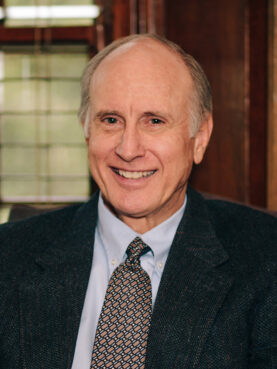
D. August “Augie” Boto in an undated image. Photo courtesy Baptist Press
Boto released an official statement saying the ABC report misled viewers into thinking “the Southern Baptist Convention somehow condones, hides or denies sexual offenses committed by ministers in SBC-affiliated churches.”
“The convention does none of those things,” Boto said. “Quite the contrary.”
Boto was later appointed to advise a committee looking into the possibility of creating an abuser database, which was eventually rejected. Instead, the Executive Committee suggested that churches rely on national registries of sex offenders and report allegations to police immediately.
“Where delay is caused by a desire to protect the reputation of the church, we believe such delay to be completely unjustified,” the Executive Committee’s 2008 report to the SBC annual meeting read.
After the Executive Committee rejected the database, Brown warned that the problem of abuse would continue and lamented that there was no place in the denomination for abuse survivors to turn.
“I believe that unless and until there is a safe place to which the victims themselves can report abuse with some reasonable expectation of being objectively heard … everything else will be window dressing,” she told Religion News Service in 2008.
But while claiming that creating a database would be difficult or impossible, Executive Committee staff were compiling a list of abusers.
“The most recent list prepared by the EC staff member contained the names of 703 abusers, with 409 believed to be SBC-affiliated at some point in time,” according to the Guidepost report.
Guidepost also detailed how Executive Committee staffers and lawyers mistreated Jen Lyell, a former Lifeway official who came forward with her story of abuse at the hands of an SBC seminary professor. An initial draft of a story by Baptist Press, the SBC’s official news publication, described Lyell as an abuse survivor, but just before publication, the story was changed to describe her as being involved in an inappropriate relationship with the professor.
According to the report, SBC officials refused to correct the story for months, causing significant harm to Lyell’s reputation and health. The story was eventually withdrawn by Baptist Press, which apologized to Lyell as part of a settlement.
One of the most chilling parts of the Guidepost report, which came with a trigger warning, involved sexual assault accusations against Hunt, who was elected at the same 2008 meeting where the database was rejected.
According to what investigators called credible allegations, Hunt was accused of sexually assaulting the wife of another SBC pastor in 2010. That assault allegedly included Hunt pinning the survivor to a couch, pulling off her clothes, and then sexual assaulting her with his “hands and mouth.”
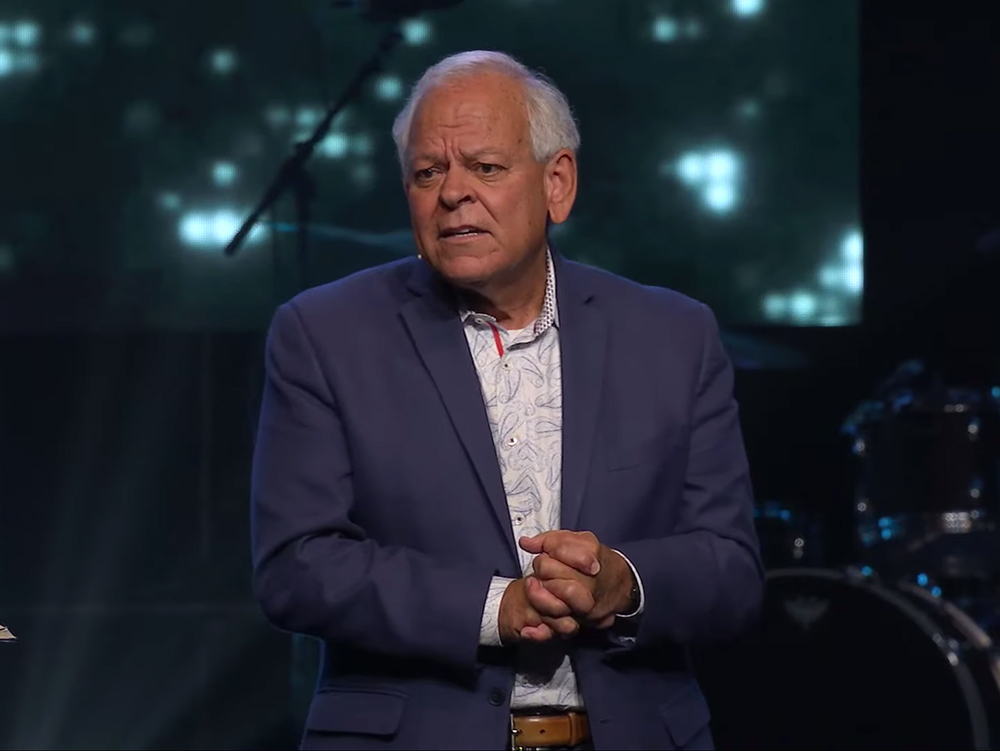
Pastor Johnny Hunt preaches in 2020. Video screen grab
“Survivor said she did not want him to ruin his ministry, at which he responded he did not want to ruin hers,” the report states. “But he then forced himself on her again by groping her, trying to pull her shirt down, and violently kissing her. Survivor did not reciprocate, but rather stood eyes open and very stiff, hoping he would just stop and leave. He finally stopped and left.”
Investigators found several witnesses who corroborated the allegations, saying that Hunt had admitted the assault and had gone on leave in 2010. They also spoke with a counselor who had counseled Hunt and the survivor.
“We include this sexual assault allegation in the report because our investigators found the pastor and his wife to be credible,” Guidepost wrote, saying, “their report was corroborated in part by a counseling minister and three other credible witnesses; and our investigators did not find Dr. Hunt’s statements related to the sexual assault allegation to be credible.”
Hunt denied the allegations during interviews with investigators. The former pastor of First Baptist Church of Woodstock, Georgia, he said on social media that “my heart breaks for all victims of abuse.”
He also acknowledged that he had resigned from the SBC’s North American Mission Board and denied the allegations against him. “To put it bluntly, I vigorously deny the circumstances and characterizations set forth in the Guidepost report,” he said on Twitter. I have never abused anyone.”
After the release of the report, the NAMB confirmed that Hunt had resigned as senior vice president of evangelism and leadership on May 13.
Rachael Denhollander, an attorney and prominent advocate for abuse survivors who served as an adviser to the abuse task force, said for decades that survivors such as Brown and Thigpen had raised the alarm to SBC leaders, to no avail.
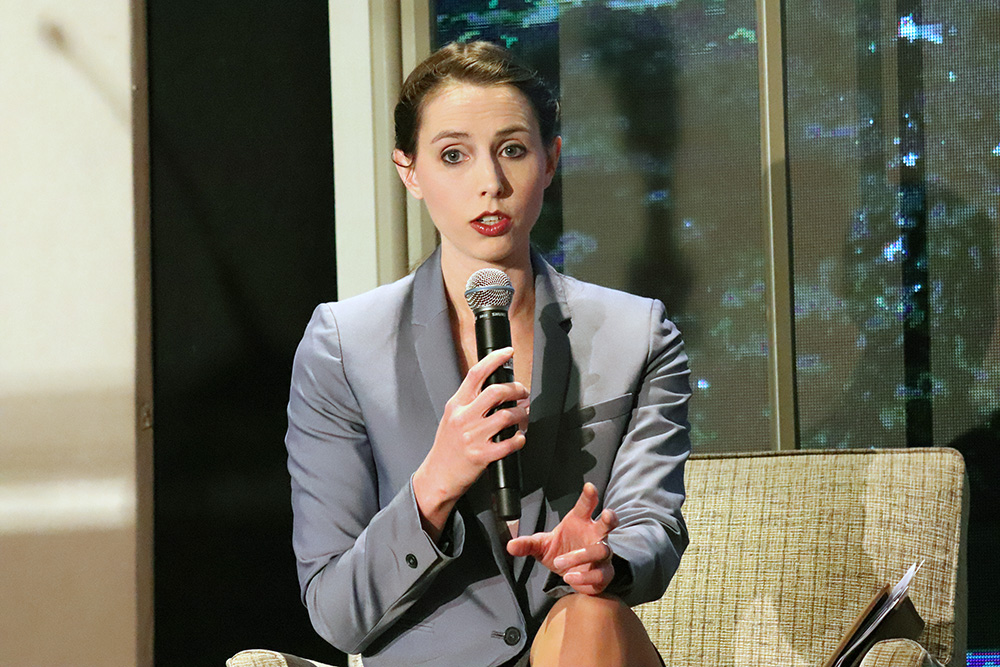
Rachael Denhollander speaks during the Presidents Conference of the Council for Christian Colleges and Universities on Friday, Jan. 31, 2020, in Washington. RNS photo by Adelle M. Banks
“There was a persistent refusal to listen to the survivors literally standing outside the door, and to seek outside help, and to listen to expert counsel,” said Denhollander. “And that resulted in a situation where two men were able to deceive and control and manipulate the denomination, literally for decades.”
She worries that Southern Baptists will place all the blame on Boto and Guenther. But many Southern Baptist leaders failed to be proactive and listen to survivors, and they never asked for second opinions, she said, or disagreed with legal counsel. Though many leaders had good intentions and wanted to help survivors, they failed to act proactively to do that.
“Southern Baptists are going to have to start asking some very difficult questions, including, and probably most importantly, how could this have gone on for so long?” said Denhollander. “How could two men have controlled and commandeered an entire denomination and an almost 100-member trustee board for the last 30 years?”
Former SBC President J.D. Greear said the report showed that the SBC should have taken action years ago to address abuse. Greear began talking about abuse in 2018, not long after becoming president, and led the denomination’s annual meeting in a service of lament after a 2019 report from the Houston Chronicle revealed hundreds of abuse cases.
“You look back to 2008 and you have to ask, ‘Why were we allowing bureaucratic mumbo jumbo and legalese to keep us from doing the right thing?’” he said.
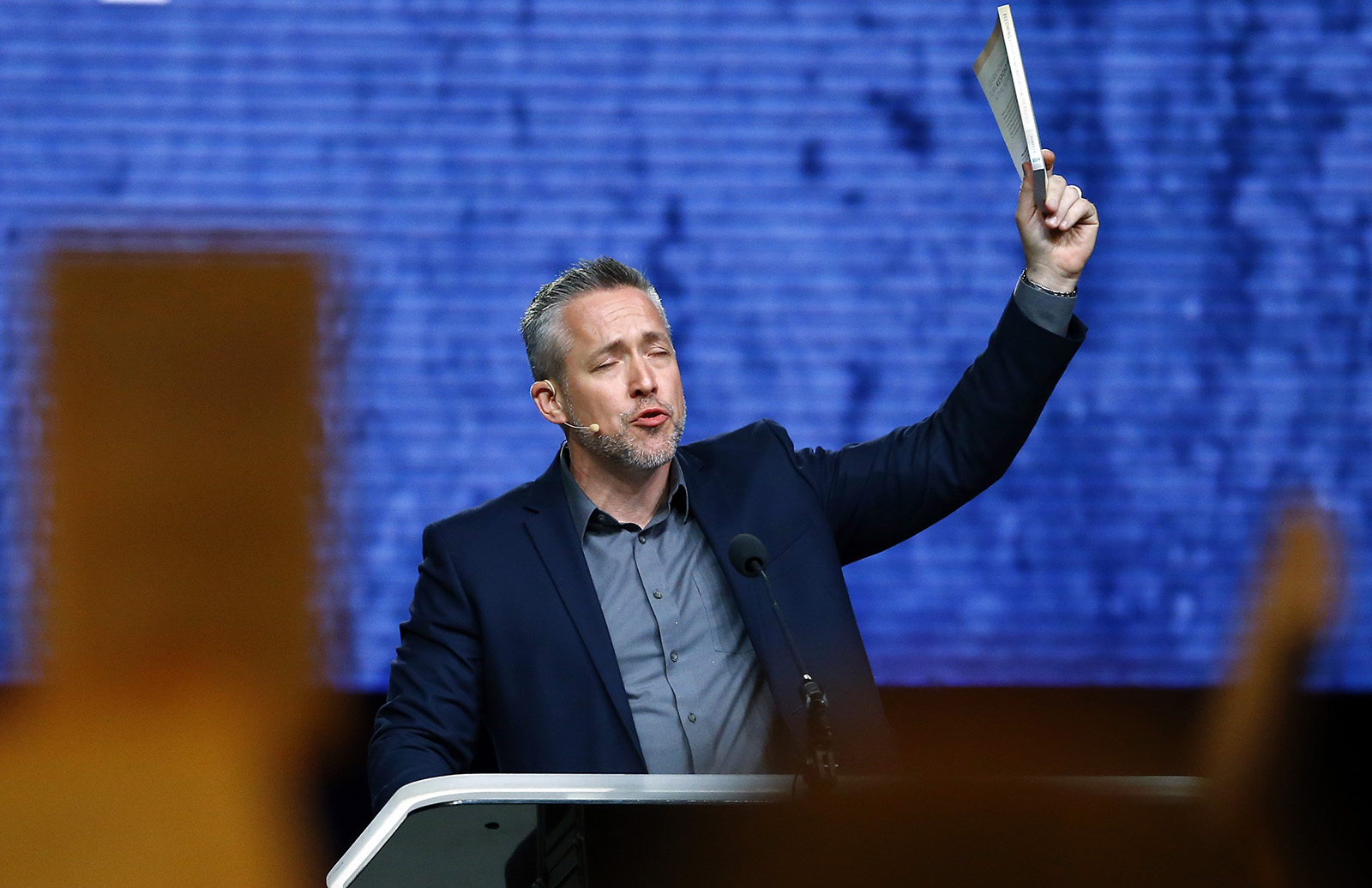
SBC President J.D. Greear offers a prayer to the church for healing from sexual abuse during the annual meeting of the Southern Baptist Convention at the BJCC, June 12, 2019 in Birmingham, Ala. RNS photo by Butch Dill.
Greear said he hopes the SBC will adopt changes to help prevent abuse in the future and to care for survivors. He said that for too long, church leaders gave the benefit of the doubt to the institution.
“It is very apparent that what the Bible would counsel us to do is to give the benefit of the doubt to the survivors,” he said.
The report includes a series of recommendations for the SBC, including creating an “Offender Information System” to track known abusers, along with starting an independent commission to deal with abuse, restricting the use of nondisclosure agreements and creating standards for churches to certify that they are following best practices.
“We must resist the temptation to minimize, to look away, to find the easy ‘scapegoats’ for what was uncovered in this report, and instead ask ‘what could we have done better?’ and ‘what should we do now?’” the task force said in a statement. “As a Convention, we did not hold our own leaders accountable, and we did not listen to the warnings. Leaders had access to expertise but chose not to seek assistance, and in some cases, rejected any assistance that was offered.”
RELATED: Jennifer Lyell wanted to stop her abuser by telling her story. Instead, her life fell apart.
